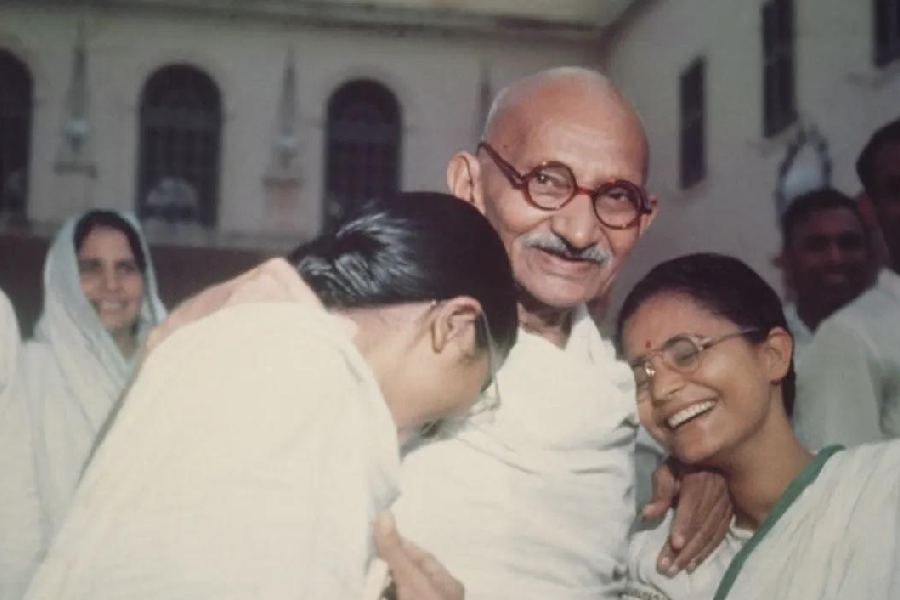In the midst of a recent discussion, a simple yet profound query emerged: "Why isn't Gandhi bestowed with the title of a saint?" Our teacher, perhaps aiming to infuse a touch of levity into our ponderings, responded playfully: "Perhaps because he wasn't a Christian!"
Gandhi, widely recognised as the father of the nation and the Mahatma, was an iconic figure of non-violence. However, as we delve deeper, it becomes apparent that he was far from a flawless deity. Perhaps a re-evaluation of our perceptions of him, acknowledging both his revolutionary ideals and his imperfections, is not unwarranted. This is all the more important because he has, on occasions, been showered with accolades for qualities he never truly embodied, such as being a champion of feminism or equal rights for women. Most of his conduct, particularly that concerning women, contradicted his public advocacy. In reality, he fell short of being a supporter of gender equality. Moreover, certain elements of his personality give rise to deeply troubling questions that are difficult to pardon or rationalise.
Gandhi's vision of an ideal woman, embodied by mythical figures like Sita, Draupadi and Damayanti, emphasised superior moral courage rather than portraying them as victims of inequality. He regarded virtue to be the most significant strength of women, to be measured primarily in terms of their chastity and moral character. He claimed that it was physically impossible to violate a woman against her will and that an assault only occurred when she succumbed to fear or didn't realise her moral strength. Upon learning that a man had been harassing his female followers, he took immediate action by having the girls' hair cut to deter any further unwanted attention. Gandhi believed that a fearless woman, aware of her purity as her ultimate shield, could never be dishonoured, even by the most brutal of men. This concept made non-violence a formidable ideal for Indian women; they were encouraged to embrace and uphold this quality in a bid to balance the perceived aggressiveness of men lacking such ‘feminine qualities’.
Gandhi undoubtedly dedicated himself to women's education and empowerment. But he often asserted that women belong to the household. His commitment to feminist ideals, influenced by deep-seated cultural norms ingrained over generations, was not always consistent. He vigorously promoted women's involvement in spinning as a means for them to generate income from within the comfort of their homes. Simultaneously, he frequently expressed concerns about women facing mistreatment when they ventured outside to work, especially from mill workers and construction supervisors, often endangering their chastity. The perceived shame experienced by weavers' daughters and wives played a pivotal role in his advocacy for hand-spinning.
Gandhi is often hailed as a trailblazer in empowering women and encouraging their active involvement in the nationalist movement at a time when they were confined by patriarchy and the purdah system. He regarded women as proactive agents capable of instigating changes in their societal status. However, his stance on prostitution and sex workers contradicted his advocacy for ‘neighbourliness’ in dealing with profound differences and striving for a universal ethos. Sex workers represented everything that contradicted Gandhi’s vision of the epitome of Indian womanhood. When 350 sex workers from Barisal, who had contributed to the Tilak Swaraj fund, expressed their desire to assume leadership roles, Gandhi declined, asserting that only those with pure intentions and actions could serve the cause of swaraj. He encouraged them instead to explore the option of engaging in hand-spinning. His failure to recognise sex workers as valid members of society led him to distance himself from matters concerning them and to publicly criticise them. Even though he supported the cause of Harijans, Gandhi did not extend the boundaries of social inclusiveness to encompass sex workers. While the growth of urban prostitution was undeniably linked to the economic struggles of rural female artisans and the displacement caused by famine, Gandhi's perspective remained focussed merely on individual choice. He advocated celibacy and brahmacharya, even within married couples, firmly believing that women lacked sexual desire, which he considered the exclusive domain of men. It remains uncertain whether he consulted his wife, Kasturba, before taking the vow of celibacy. Gandhi conducted unconventional experiments aimed at confirming his own celibacy driven by a determination to avoid any predatory behaviour. The highly controversial celibacy experiments commenced following the passing of his wife. He extended these experiments to include Manu, the teenaged daughter of his nephew, to test the purity of his vow of celibacy. His stenographer, R.P. Parasuram, left the ashram in protest when Gandhi refused to stop these ‘experiments’.
On scrutinising Gandhi's legacy through the lens of feminism, it becomes evident that his advocacy for gender equality was fraught with contradictions and limitations. The attempts to brand Gandhi as a feminist should prompt us to ask: are we too quick to bestow such titles on historical figures without considering the nuances of their beliefs and actions? In seeking a deeper understanding of Gandhi's stance on women's rights, we must acknowledge the complexities that emerge when we juxtapose his ideals with his behaviour. Ultimately, this exploration invites us to question not only Gandhi's legacy but also our own tendency to simplify the narratives of complex historical figures.
Diya Binu is a Development Studies student at the Indian Institute of Technology, Madras










